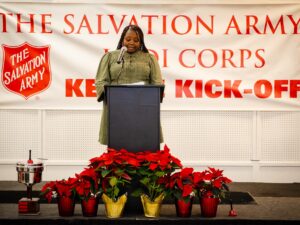Salvation Army serves during crisis in Mexico.
by Luis Uribe –
On this ordinary Tuesday morning in Juarez, a Mexican city close to the U.S. border, The Salvation Army’s doors are open as usual.
A second glance reveals that nothing is ordinary; nothing is as it should be. Soldiers directing traffic and standing guard at banks; army units patrolling the streets—this is now the norm in this town of 1.5 million people, one of the most affected by the problems that shake almost the entire country.
Combined with the troubled economy, fear over the violence from warring drug cartels is affecting the U.S.-Mexican border—and beyond.
“The atmosphere of the city is heavy… and sad,” said Captain Rene Rodriguez, corps officer of the Juarez Corps and director of the Children’s Care Center. “After 5 or 6 p.m. nobody wants to be on the streets, and the people are in their homes, doors locked.”
Juarez is not the only city impacted by the drug trafficking cartels that are fighting each other for power and territory.
“Here in El Paso, we are suffering the effects of the violence in Mexico,” stated Major Pedro Delgado, corps officer of El Paso Temple, Texas, in the Southwest Division. “People are not visiting Juarez anymore, and that is affecting the economy. Also, families are being separated, not by the Border Patrol, nor at the bridge (the entry port), but because of the violence.”
Ciudad Juarez, commonly called Juarez, and El Paso comprise one of the largest bi-national metropolitan areas in the world with a combined population of 2.5 million people. Previously, more than 60,000 people crossed the border daily, making Juarez the major port of entry for all of central northern Mexico, according to Border Patrol reports.
The escalating violence has changed all that. In 2008, action generated by the warring drug cartels produced 1,600 casualties in Juarez alone according to an official Mexican government report.
The Salvation Army exists within a culture and responds to the problems of the culture.
“We are also affected because we feel bound to help the people,” Delgado said. “But our fight is not with arms; we can help them with prayers. “That’s what we are doing, praying for Juarez.”
The conflicts between the drug cartels are now commonplace not only in Juarez but also in Tijuana, Monterrey, Morelia and many other Mexican cities. The situation has affected people’s lives on both sides of the border, as well as causing concerns within the U.S. government. Several agencies of the U.S. government are working with the Mexican government, devising a joint plan to improve safety. These include the Department of Homeland Security, the Department of Justice, the U. S. Drug Enforcement Administration, the Federal Bureau of Investigation and the Bureau of Alcohol, Tobacco, Firearms and Explosives. It is hoped that these efforts will stabilize life within the affected communities, allowing The Salvation Army to continue its outreach ministries.
One Army stands strong
Despite the climate of fear in Mexico and in U.S. cities close to the border, the work of The Salvation Army continues.
“No matter what, the Children’s Care Center is working normally,” said Rodriguez, speaking about the activities in Juarez. “We have 100 children from two months to 12 years old and the center is open Monday to Friday, from 5:00 a.m. to 8:00 p.m.” But the economy is affecting the fees and the donations for the programs. “The fee collection is more than 90 percent down and the public contribution disappeared; business in general is affected.”
As Rodriguez said in Spanish, “Donde una puerta se cierra, una ventana se abre” (when a door closes a window opens)—a new resource from the government has alleviated the bad economic situation. “The municipality offers scholarships to women with children who work. If they complete the documents correctly, they receive the money to pay for the fee at the Children’s Care Center.”
Rodriguez explained: “Since January 2009, we have benefited from the ‘Impulse Program,’ an initiative of the municipality of Ciudad Juarez. It was difficult to make this happen, but well worth the effort.”
The program is a partnership between the government and private organizations. “We provide the space and they provide the equipment,” said Rodriguez.
“First of all,” he continued, “they installed video cameras and alarms, because they do not want to lose their equipment. Also, we have a panic button that connects us directly with the police; when we use it, the closest patrol unit arrives in less than three minutes.”
The Impulse Program donated 10 notebook computers—connected to the Internet—to the center. “The requirement was that we hold one class a week for children between 4 and 12 years old, but we have two classes, sometimes three.”
The center also received equipment for a game room, including a mini-soccer table, an electric jockey game, a large TV and an iPod loaded with children’s music. The program also provided a puppet theater, books and some guitars. “Now we have music classes daily,” said Rodriguez.
“In addition, because we are now part of a city program, every child has life and health insurance protecting them while at the facility; the volunteers are included, too,” stated Rodriguez.
Ciudad Juarez University, “teaching and social service students come to the center and give English and computer classes and help with the children.”
Another Salvation Army program, “Alimento para el Migrante” (Food for Migrants), offers lunch for around 40 – 50 people daily, immigrants who have been deported from the U.S.
Previously, these people remained in the city, but now due to the violence and the troops, they leave the area quickly.
On the U.S. side of the border, despite the bad economy, the El Paso Temple and Citadel corps continue working tirelessly.
“The violence at the border has not affected the corps’ assistance programs or activities,” said Delgado. “We have less resources because of the bad economy but people continue to attend the activities and the programs are running well.”
From Monterrey to Tijuana through Piedras Negras
With a population of 3.8 million in its metropolitan area, Monterrey—capital of the Nuevo León state, located approximately 560 miles southwest of Juarez—is another city enduring violence from the warring drug cartels. In 2005, Monterrey was ranked the most secure city in Latin America, but not anymore; from January 1 to March 30, violence claimed the lives of 40 people from the city.
“Our major concern is that people are using drugs in front of our Children’s Center, and the kids can see that,” said Major Maria del Carmen Lopez, Monterrey corps officer. “What we are doing is creating a safe environment where we teach children sound values and good ideas; we aim to avoid the drugs and the violence. We are trying to lead them to Christ’s path.”
Despite difficult circumstances, the corps is seeing an increased youth attendance, in part due to music. “We have developed music programs for the youngsters and that helped a lot. The music motivates and attracts them,” said Lopez.
Piedras Negras (Black Rocks) is a border city on the Mexican Riviera of the Rio Grande River, near Eagle Pass, Texas. With a population of 142,000 people, the town is an exception to the wave of violence engulfing Mexico.
“For the first time, Piedras Negras doesn’t have as much trouble as the rest of the country,” stated Captain Hassan Flores, Salvation Army corps officer there. The reduction in violence has occurred in part because many people cannot cross the border to enter the U.S. “Now it’s more difficult to cross [the border] and many are leaving the city. We are helping people who do not have a place to sleep; they are the ‘border homeless’,” explained Flores.
A new kind of smuggler is emerging. “Criminals use children to smuggle people; if they are captured, it is considered a minor offense because of their age. The authorities just give them back to the parents. “That is another reason to motivate parents to send their children to the school. We average between 30 to 40 children daily.”
The Salvation Army’s shelter in Piedras Negras can house 30 people, “but sometimes we need to accommodate 40. It is difficult to find resources, but we have donations and Wal-Mart Foundation provides some food.”
In Tijuana, which borders California, people no longer walk outside at night safely.
“During our services everything is normal. We have around 75 children attending Sunday school, and in the afternoon approximately 50 adults go to the meeting. At night we have a service for migrants with 70 or 80 people,” said Captain Erasmo Vargas, Tijuana corps officer .
Major James Hood, a U.S. Western Territory officer serving as director of property for the Mexico Territory, described two important programs in Tijuana. “The Army recently opened a new day care center with extended hours to try to protect the children from the human traffickers. Additionally, we have a migrant center near the corps where men stay overnight and go to the U.S. for jobs during the daytime.”
In addition, the Tijuana Corps maintains a program to help people who have been recently deported and have no family or contacts nearby.
“They receive a dinner at 7:00 p.m., then a bath and a warm bed. We lodge them a maximum of 15 days. Some only stay two or three days; others remain more than a week while contacting their families and getting the papers to return to their homes. Lately, most of the deported had 10 or 15 years living in the U.S.,” Vargas explained. “They left behind their spouse and children.”
Sometimes a group that help migrants comes to the shelter with a group of deportees at 2:00 or 3:00 a.m. Vargas said that he and his wife, Captain Ofelia Gres, shelter them. “The Salvation Army works 24/7,” he said.
While the drug cartel war continues affecting both sides of the border, the work of The Salvation Army maintains its strength, helping people deal with difficulties and trying to bring them to Jesus.
“While we pray for this situation to end quickly, we continue—as The Salvation Army—to minister to the people in the name of Jesus Christ,” concluded Rodriguez.











